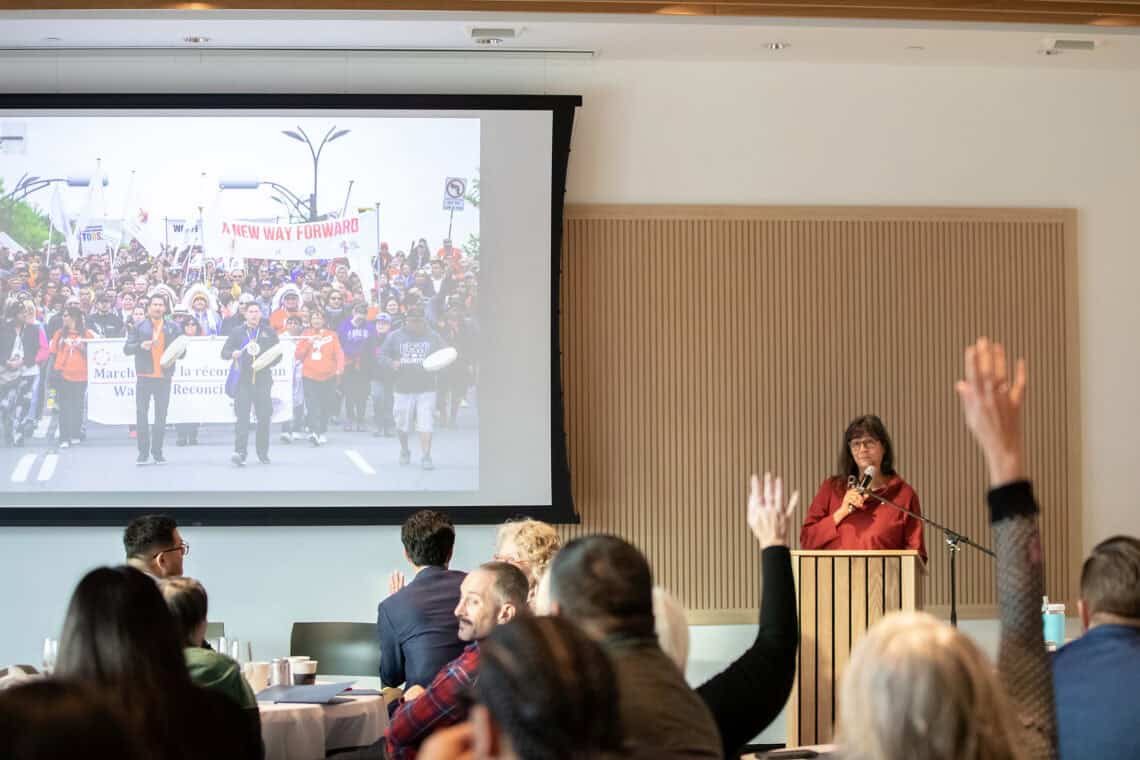Inuit face food insecurity, cultural loss 13 years into Labrador caribou hunting ban
This is the first piece from Frey Blake-Pijogge, a writing fellow working with The Philanthropist Journal and The Independent in Newfoundland and Labrador.
Why supporting Black founders strengthens Canada’s economy
When capital finds Black founders, it grows enterprises, creates jobs, and diversifies the innovation ecosystem. Initiatives led by non-profits and philanthropy are demonstrating what more responsive capital can look like.
Funding legal support for survivors is an upstream intervention
Legal representation can have a significant impact on women and children’s socio-economic outcomes. And yet, access to a family lawyer is still considered a luxury for many women.
How a new funding relationship is transforming children’s mental health in Canada
A partnership between a family foundation and a grassroots charity demonstrates what happens when two organizations trust each other enough to shift power, follow community wisdom, and explore an idea without prescribing what it must become.
Featured
Analysis
On the front lines of eviction prevention
‘A little goes a long way’ in keeping people housed, advocates say, and the social costs of not addressing the housing crisis are immeasurable.
10 years after the TRC, Indigenous philanthropy is gaining momentum
In 2015, the Canadian philanthropic community made a “pledge to do better” on reconciliation. At an event marking the 10th anniversary of the Declaration of Action, Indigenous-led charitable foundations took centre stage.
Philanthropy and Funding
Funding for women’s shelters: Government and philanthropy as powerful partners
Ending gender-based violence requires a whole-of-society approach. Collaboration between these two large societal institutions creates stronger, more adaptive supports for women, children, and gender-diverse people fleeing violence.
The most important infrastructure isn’t in the budget
Philanthropy has a crucial role to play in supporting the chronically underfunded work of gender justice organizations – which are holding communities together in an age of precarity – and the moment is now.
Case Studies & Guides
Strategy development at medium-sized non-profits
The 1Up Single Parent Resource Centre in Victoria recently rethought and refreshed its fundamental strategy and inventory of programs. Board member Erwin Martinez shares their experience, and a model he invites other non-profit boards to follow.
Lessons learned through local economic development
In response to funding trends and increasing service demands, some community organizations, including United Way Centraide, are shifting from traditional funding models to community investment strategies. President and CEO Dan Clement shares three case studies that highlight how it works.
Decolonization and Reconciliation
Northern Manitoba shows philanthropy how to move from transaction to transformation
The lessons emerging from the work of the Northern Manitoba Food, Culture, and Community Collaborative – about collaboration, relationships, and learning to be a good helper – “can and should be adopted by all of philanthropy.”
The power of unrestricted support: A story of Indigenous strength and sovereignty
At the 25th International Funders for Indigenous Peoples Global Conference in Kenya, one theme stood out, Rachael Sonola writes: Indigenous sovereignty is not just about land or governance; it is about the power to decide, to shape, and to thrive on our own terms.
Series on Work in Progress
Volunteerism: In crisis or at a crossroads?
With volunteering in Canada in decline, contributor Yvonne Rodney looks at the data and talks to sector leaders to ponder the way forward. The solution, she writes, includes acknowledging the impact of the pandemic, understanding generational differences, and convincing funders to do more to help organizations.
The decision to step down: Reflections from four foundation leaders
When long-serving leaders leave their roles, what can we learn from them that will help our sector traverse the challenging times ahead?
Building a sense of belonging and connection at work in the hybrid era
With remote and hybrid work the new norm post-pandemic, non-profits are tailoring strategies to ensure that employees feel heard, seen, and valued – and have discovered that there’s no one-size-fits-all approach.
Subscribe
Canadian non-profit sector news, in your inbox
Never miss news and analysis by and for the Canadian non-profit sector
Most Popular
Analysis
How to support non-profits in AI adoption
Non-profit leaders are struggling to figure out how AI fits into their organizations while navigating ethical, privacy, and governance concerns. Contributor Julie Sobowale looks at some of the challenges and opportunities.
What does a ‘trilemma’ mean for the sector in 2026? We turned the tables and asked journalists to weigh in
We asked journalists who cover the sector to share what they’ve been hearing and thinking about the challenges facing the charitable and philanthropic sector in 2026.
Creative outlets: Why some non-profit leaders are picking up the mic
Creative pursuits outside of work like stand-up comedy or playing in a band might just be what your colleagues in the philanthropic sector need right now – to counter burnout, strengthen skills, or express their whole selves.
To grieve, to learn, to unite: A eulogy for an ever-shifting sector
The loss, or realignment, of a funder affects the entire charitable sector, and how it chooses to say its goodbyes has far-reaching implications, both practical and emotional, contributor Angela Long writes.
More articles From the Archives
A short history of voluntary sector–government relations in Canada (revisited)
The original version of this story, published in 2007, is one of The Philanthropist Journal’s most popular pieces of all time. In this updated version, Peter Elson and Peyton Carmichael expand on that detailed (and not so short) history.
Charities and the rule against perpetuities
Charitable status is a legally privileged status. The law in numerous ways, ranging from the trivial to the noteworthy, confers legal advantages upon charities. These legal advantages are often misunderstood.
‘We don’t have a word for philanthropy’
What do Indigenous Peoples mean when they talk about Indigenous philanthropy? Miles Morrisseau put this question and others to Indigenous people who are leaders in the philanthropic sector.
Strategies for a caring society
This article was developed from a paper presented at Investigating in the Whole Community: Strategies for a Caring Society, a conference organized by the Trillium
Featured Contributors
-
Angela Long
Angela Long is a freelance writer currently working on a book about rural journalism in Canada.

-
Yvonne Rodney
Yvonne Rodney is a Toronto author, career consultant, speaker, and non-profit worker with extensive experience in career development. She is the author of Moving On: A Quick Guide for Non-Profit Workers and Military to Civilian Employment: A Career Practitioner’s Guide.

-
Christina Palassio
Christina Palassio is a non-profit communications professional and freelance writer. When she tweets, she does so at @mcpalassio.

-
Tim Harper
Tim Harper is a Toronto-based writer. He is a former Washington correspondent and national affairs columnist with the Toronto Star.

- All Featured Contributors


























